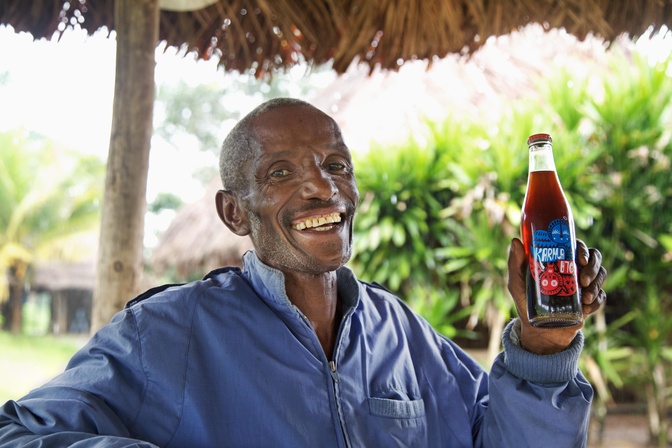The soft drink in your favourite cafes has an ethical story behind it.

By Tegan Reeves
Do you know what the ingredients in Coca-Cola are? You probably don’t. The Coca-Cola Company has done a great job of making people think the main ingredient in Coca-Cola is a secret. But it’s actually made from the kola nut, a fruit of the kola tree, native to the tropical rainforests of Africa.
Simon Coley, the co-founder of NZ company All Good Organics heard about the kola nut while expanding his All Good Banana brand (a company that supplies New Zealand with fair-trade bananas from Ecuador). He was amazed to learn that cola, one of the world’s most popular carbonated drinks, is flavoured by the kola nut.
Coley’s business partner Chris Morrison had experience producing soft drinks, and Coley saw an opportunity to produce a cola-flavoured soft drink under the All Good Organics banner (the company also produces Lemmy Lemonade and Gingerella). He began work on sourcing the kola nuts from Sierra Leone, and All Good Organics went about creating a soft drink that would benefit both producers and consumers.
“We tried hundreds of recipes and variations until we got it right,” Coley says. “There’s a few exotic ingredients, like coriander seed, cinnamon and nutmeg, all of which are organic.” The Karma Cola soft drink is now a regular in many Australian and overseas cafes.
Five cents from the sale of every bottle goes to the Karma Cola Foundation, which aids the Mami Watia community in Sierra Leone. (it farms the kola nuts). So far the money has been put towards education and infrastructure projects.
The idea of creating something from nothing has driven many aspects of the Karma Cola brand. Its marketing strategy doesn’t follow any textbook example. With limited resources and funds, Coley knew the brand would have to do something unique to get noticed.
“It’s [the brand’s] story that needs a bit of time – it’s hard to get it in a snappy ad,” he says. “That was one of our challenges. We needed a story that engages people and gives them something to share.”
The answer was the What Goes Around zine. It was distributed in coffee shops around Australia and New Zealand, places where people have the time to read about the back-story of Karma Cola. “We included stories of ethical business, photos from Sierra Leone and a lot of other fun stuff,” Coley says. He says consumers’ understanding of the Karma Cola story is what drives Karma Cola sales.
An established creative director, Coley isn’t driven by a passion for money. He enjoys a challenge and creating workable solutions that will benefit everyone. Good Organics and Karma Cola are concerned with the idea of a virtuous circle. If people buying these products can tangibly understand that there is a benefit to the people producing them, the circle closes.






